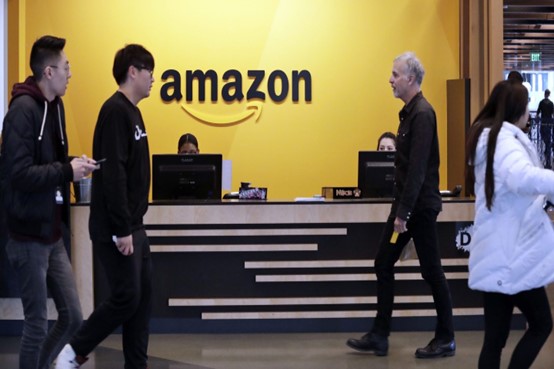
成立30年的亚马逊(Amazon)已成为全球最大的雇主之一,按员工人数计算,它是美国第二大公司,仅次于沃尔玛(Walmart)。它也是最受赞赏的公司之一。
亚马逊在世界各地的仓库和办公室有150万员工。一直以来,该公司为这个庞大的员工队伍投资实施了各种计划,让他们定期提供工作体验反馈,其中包括一个名为“Connections”的日常调查工具。
尽管Connections调查的结果旨在发现有问题的领域(或管理者)并寻求解决方案——“我们的目标是帮助培养赢得信任的领导者,消除追求卓越的障碍,使亚马逊成为一个令人鼓舞的工作场所”——但亚马逊也在利用Connections的调查数据回击有关员工不满的公开报告。
多年来,亚马逊的员工一直向本报记者提出一条建议:对数据持怀疑态度。
最近,《财富》杂志的一篇文章记录了亚马逊客户服务员工面临的挑战和恐惧,亚马逊在回应时引用了其员工调查结果。亚马逊创始人杰夫·贝索斯在其作为首席执行官的最后一封年度股东信中谈到工会工作时,也引用了来自仓库员工的Connections调查数据。
许多亚马逊员工指出,Connections计划的初衷似乎确实是好的,一些参与过该计划的员工称赞它是公司创建日常员工调查的首批大规模实验之一。
尽管如此,许多亚马逊员工还是对反馈以及亚马逊引用的数据的准确性提出质疑,因为他们表示许多员工在参加Connections调查时并没有如实回答问题。
员工们表示,造成这种情况的原因有很多。员工最担心的问题是,他们匿名回答并不像公司所说的那样万无一失。例如,在小型团队中,员工担心他们的管理者会根据管理者与员工的整体关系,推断出谁以何种方式回答了问题。亚马逊发言人玛格丽特·卡拉汉表示,员工的回答是保密的,只有当一个团队至少有四名员工时,管理者才能看到汇总结果。对于规模较小的团队,管理者和其他领导者均看不到调查反馈。但员工们认为,即使是四人或人数更多的团队,也无法掩盖回答者的身份。
员工们表示,有些管理者甚至会操纵调查结果,指导直接下属如何回答某些问题,或向他们强调负面反馈会对管理者的地位产生负面影响。
一位亚马逊员工向《财富》抱怨一名管理者称:“她不是自我反省为什么自己的分数很低,而是经常霸凌我们,让我们给她打更高分数。”
亚马逊的卡拉汉表示,管理者试图影响员工回答的行为违反了公司政策,而且员工可以选择不回答Connections的问题。
她在给《财富》杂志的一份声明中指出:“我们一直在努力改善员工的体验,所以我们才会通过Connections每天收集反馈。员工可以选择是否回答,他们的回答将始终被保密并经过汇总,领导者收到的反馈有助于他们建立更强大的组织。我们听到绝大多数团队成员评价Connections是一种有用的工具,这篇文章中分享的轶事并不能反映大多数人的经历。”
卡拉汉补充说,每日调查的频率允许管理者过滤不同时间段的结果,并查看该工具在一段时间内定期询问的几个问题的趋势。与每个月或每年一次的员工调查相比,如果每日调查得到妥善落实,调查数据能让管理人员更快解决问题。
另一方面,一些员工表示,他们之所以不提供坦诚的反馈意见,是因为他们担心自己喜欢或尊敬的管理者,会因为员工提出的超出管理者能力范围的问题而受到惩罚。
无论如何,当亚马逊下一次引用调查数据来描绘其工作环境时,至少应该注意许多员工的观点:实际情况远非如此。(财富中文网)
翻译:刘进龙
审校:汪皓
ELAINE THOMPSON—美联社
成立30年的亚马逊(Amazon)已成为全球最大的雇主之一,按员工人数计算,它是美国第二大公司,仅次于沃尔玛(Walmart)。它也是最受赞赏的公司之一。
亚马逊在世界各地的仓库和办公室有150万员工。一直以来,该公司为这个庞大的员工队伍投资实施了各种计划,让他们定期提供工作体验反馈,其中包括一个名为“Connections”的日常调查工具。
尽管Connections调查的结果旨在发现有问题的领域(或管理者)并寻求解决方案——“我们的目标是帮助培养赢得信任的领导者,消除追求卓越的障碍,使亚马逊成为一个令人鼓舞的工作场所”——但亚马逊也在利用Connections的调查数据回击有关员工不满的公开报告。
多年来,亚马逊的员工一直向本报记者提出一条建议:对数据持怀疑态度。
最近,《财富》杂志的一篇文章记录了亚马逊客户服务员工面临的挑战和恐惧,亚马逊在回应时引用了其员工调查结果。亚马逊创始人杰夫·贝索斯在其作为首席执行官的最后一封年度股东信中谈到工会工作时,也引用了来自仓库员工的Connections调查数据。
许多亚马逊员工指出,Connections计划的初衷似乎确实是好的,一些参与过该计划的员工称赞它是公司创建日常员工调查的首批大规模实验之一。
尽管如此,许多亚马逊员工还是对反馈以及亚马逊引用的数据的准确性提出质疑,因为他们表示许多员工在参加Connections调查时并没有如实回答问题。
员工们表示,造成这种情况的原因有很多。员工最担心的问题是,他们匿名回答并不像公司所说的那样万无一失。例如,在小型团队中,员工担心他们的管理者会根据管理者与员工的整体关系,推断出谁以何种方式回答了问题。亚马逊发言人玛格丽特·卡拉汉表示,员工的回答是保密的,只有当一个团队至少有四名员工时,管理者才能看到汇总结果。对于规模较小的团队,管理者和其他领导者均看不到调查反馈。但员工们认为,即使是四人或人数更多的团队,也无法掩盖回答者的身份。
员工们表示,有些管理者甚至会操纵调查结果,指导直接下属如何回答某些问题,或向他们强调负面反馈会对管理者的地位产生负面影响。
一位亚马逊员工向《财富》抱怨一名管理者称:“她不是自我反省为什么自己的分数很低,而是经常霸凌我们,让我们给她打更高分数。”
亚马逊的卡拉汉表示,管理者试图影响员工回答的行为违反了公司政策,而且员工可以选择不回答Connections的问题。
她在给《财富》杂志的一份声明中指出:“我们一直在努力改善员工的体验,所以我们才会通过Connections每天收集反馈。员工可以选择是否回答,他们的回答将始终被保密并经过汇总,领导者收到的反馈有助于他们建立更强大的组织。我们听到绝大多数团队成员评价Connections是一种有用的工具,这篇文章中分享的轶事并不能反映大多数人的经历。”
卡拉汉补充说,每日调查的频率允许管理者过滤不同时间段的结果,并查看该工具在一段时间内定期询问的几个问题的趋势。与每个月或每年一次的员工调查相比,如果每日调查得到妥善落实,调查数据能让管理人员更快解决问题。
另一方面,一些员工表示,他们之所以不提供坦诚的反馈意见,是因为他们担心自己喜欢或尊敬的管理者,会因为员工提出的超出管理者能力范围的问题而受到惩罚。
无论如何,当亚马逊下一次引用调查数据来描绘其工作环境时,至少应该注意许多员工的观点:实际情况远非如此。(财富中文网)
翻译:刘进龙
审校:汪皓
Thirty years after its founding, Amazon has grown into one of the largest employers in the world and the second-largest corporation in the U.S. by staff size, trailing only Walmart. It’s also one of the most admired.
Along the way, the company has invested in programs for its massive, 1.5-million-employee workforce—spread across warehouses and offices around the world—to provide regular feedback on their work experience, including a daily survey tool known as Connections.
While the results from Connections surveys are meant to identify problem areas (or problem managers) and seek solutions—“Our goal is to help develop leaders who earn trust, remove barriers to excellence, and make Amazon an inspiring place to work”—Amazon has also utilized Connections data when combating public reports of dissatisfied employees.
And when it does, employees have for years been known to reach out to this reporter with a suggestion: Be skeptical of the data.
Most recently, Amazon cited its employee survey results in response to a Fortune article documenting the challenges and fears facing Amazon’s customer service employees. Amazon founder Jeff Bezos also cited Connections data from warehouse staff when he addressed unionization efforts in his final annual shareholder letter as CEO.
To be clear, many Amazon employees note that Connections appears well-intentioned, and some who’ve worked on the program have lauded it as one of the first large-scale experiments involving a company creating a daily employee survey.
Still, many Amazon employees question the accuracy of the feedback—and thus the data Amazon cites—because they say many workers don’t answer Connections questions honestly.
The reasons for this are numerous, employees have said. Chief among employee concerns is that the anonymity of their responses is not as bulletproof as the company would like to suggest. On small teams for example, employees are concerned that their manager can deduce who responded in what way based on the overall manager-employee relationship. Amazon spokesperson Margaret Callahan said employee responses are confidential and that managers see aggregated results only when a team has at least four employees. For smaller teams, survey responses are not visible to managers nor other leaders. But even team sizes of four or more can leave little cover for who answered how, employees argue.
And some managers go so far as to put a thumb on the scale, employees say, by coaching their direct reports on how to answer certain questions or stressing to them that negative feedback can negatively impact the manager’s standing.
“Rather than self-reflection on why her scores are low,” one Amazon employee told Fortune of a manager, “she regularly bullies us to give better scores.”
Amazon’s Callahan said it’s against company policy for managers to attempt to influence employee responses, and that employees can always choose not to answer Connections questions if they prefer.
“We’re constantly working to improve the experience of our employees, and that’s why we collect feedback daily through Connections,” she noted in a statement to Fortune. “Employees can choose whether to answer or not, their responses are always confidential and aggregated, and the feedback that leaders receive help them build stronger organizations. We hear from the vast majority of our team that it’s a useful tool, and the anecdotes that were shared with us for this story don’t reflect most people’s experiences.”
Callahan added that the daily frequency of the surveying allows managers to filter results for various time frames and view trends for several questions that the tool asks regularly over a period of time. In its ideal implementation, the data allows managers to alleviate problems more quickly than if the company only polled workers monthly or annually.
On the other side of the equation, some employees have said they don’t give candid feedback because they fear a manager whom they like or respect will be penalized for employee concerns that are outside of the manager’s control.
Either way, the next time Amazon cites survey data to paint a picture of its work environment, it’s worth at least noting what many employees believe: that the picture is far from complete.






